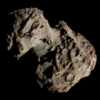114P/Wiseman–Skiff
Appearance
(Redirected from 114P/Wiseman-Skiff)
 | |
| Discovery | |
|---|---|
| Discovered by | Jennifer Wiseman Brian A. Skiff |
| Discovery date | December 28, 1986 |
| Designations | |
| 1986 Y1; 1987b; 1993 IX; 1993u; 1993 X2 | |
| Orbital characteristics | |
| Epoch | May 28, 2013[1] |
| Aphelion | 5.5124 AU |
| Perihelion | 1.5748 AU |
| Semi-major axis | 3.5436 AU |
| Eccentricity | 0.55558 |
| Orbital period | 6.67 a |
| Inclination | 18.284° |
| Last perihelion | January 14, 2020[2] May 13, 2013[3] September 13, 2006 |
| Next perihelion | 2026-Sep-15[4] |
| Jupiter MOID | 0.182 AU (27.2 million km) |
114P/Wiseman–Skiff is a periodic comet in the Solar System.
It was discovered by Jennifer Wiseman in January 1987 on two photographic plates that had been taken on December 28, 1986, by Brian A. Skiff of Lowell Observatory. Wiseman and Skiff confirmed the comet on January 19, 1987.
Comet 114P/Wiseman–Skiff is believed to have been the parent body of a meteor shower on Mars and the source of the first meteor photographed from Mars on March 7, 2004.[5]
Aphelion is located near the orbit of Jupiter. On February 25, 2043, the comet will pass 0.179 AU (26.8 million km) from Jupiter.[6]
The nucleus of the comet has a radius of 0.78 ± 0.05 kilometers, assuming a geometric albedo of 0.04.[7]
References
[edit]- ^ "Elements and Ephemeris for 114P/Wiseman-Skiff". Archived from the original on 2016-03-03. Retrieved 2011-05-26.
- ^ "114P/Wiseman-Skiff Orbit". Minor Planet Center. Retrieved 2014-06-17.
- ^ 114P at Kazuo Kinoshita home page
- ^ "Horizons Batch for 114P/Wiseman-Skiff (90000992) on 2026-Sep-15" (Perihelion occurs when rdot flips from negative to positive). JPL Horizons. Retrieved 2023-07-06. (JPL#K203/20 Soln.date: 2023-Jan-17)
- ^ Selsis, Franck; Lemmon, Mark T.; Vaubaillon, Jérémie; Bell, James F. (2005). "A martian meteor and its parent comet". Nature. 435 (7042): 581. doi:10.1038/435581a. PMID 15931208. S2CID 4336487.
- ^ "JPL Small-Body Database Browser: 114P/Wiseman-Skiff". Jet Propulsion Laboratory. Archived from the original on 2021-09-08. Retrieved 2021-09-08.
- ^ Lamy, P. L.; Toth, I.; Weaver, H. A.; A'Hearn, M. F.; Jorda, L. (December 2009). "Properties of the nuclei and comae of 13 ecliptic comets from Hubble Space Telescope snapshot observations". Astronomy & Astrophysics. 508 (2): 1045–1056. Bibcode:2009A&A...508.1045L. doi:10.1051/0004-6361/200811462. S2CID 125249770.
External links
[edit]


